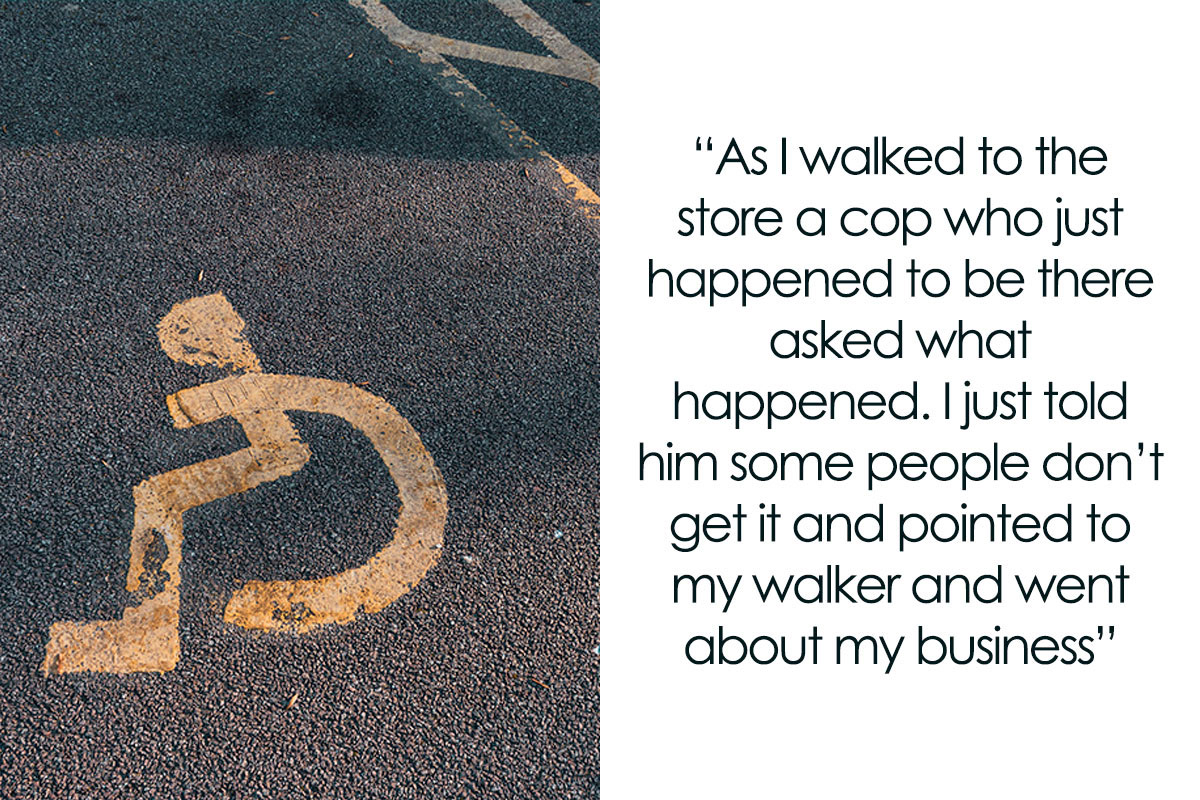
Man Shouting At A Person For Legally Using A Handicapped Parking Spot Gets Instant Karma From A Nearby Cop
Sometimes people just can’t keep their nose out of other people’s business. It’s like some sort of infectious itch, especially if they’re doing something “bad.” I’ve kinda got a hunch that HOA people are all infected by this itch, specializing in lawn length and trimming color.
Today’s story largely features one of these people. A man with an invisible disability had legally parked in a handicapped spot, when another person was like, “Hey, me and that other person are having too good of a day today,” and decided to verbally assault them with hilarious consequences.
More info: Reddit
Some people just can’t go about their day without getting in at least one person’s business
Image credits: Timothy Krause (not the actual photo)
The poster wanted to share how they got assaulted by a random person for legally using a handicapped parking spot
Image credits: AZNM1912
Image credits: KOMUnews (not the actual photo)
The person berated him, saying that spot is for other people, while the poster had an invisible disability and the other person was just being ignorant
Image credits: AZNM1912
Karma caught up with the abuser, with a policeman noticing the commotion and arresting them for an unrelated DUI
The original poster of the story (OP), going by the easy-to-pronounce name of AZNM1912, began by saying that they’re a healthy-looking male, 55 years of age, and have an invisible disability.
They went grocery shopping, parked in a handicap spot, put their placard up, and then a random person decided to get upset about it, being ignorant and berating OP.
Conveniently, the poster encountered a cop along his way to the store, told them about the enraged person and went about their day. Through a stroke of luck, or perhaps fate, the annoying busybody was arrested by that same cop for a DUI, after likely failing a sobriety test.
If you were to nose around on the internet, you’re pretty likely to find many stories from people with visible and invisible disabilities being discriminated against in various ways by people who should really be minding their own business.
Lainie Ishbia, a TEDx speaker, disability life stylist, and educator has gone into great detail about her experience about living with an invisible disability in her TEDx talk – Gambling on Humanity With An Invisible Disability.
She mentions a thought-provoking fact – that 1 out of 4 are living with disabilities, a total of 61 million people in the US alone. Furthermore, Lainie mentions that 80% of these disabilities are invisible and that most people are likely to have a disability at some point of their life, even if temporarily, after an accident or illness.
Lainie goes on to say that it was liberating and empowering for her to “come out” about her disabilities, talking about it to friends and strangers, even if it was scary to be so vulnerable.
But besides that, according to Lainie and many others, ableism is still alive and well, affecting many people with visible and invisible disabilities alike.
Image credits: Paul Swansen (not the actual photo)
Just in case you aren’t aware, according to Access Living “ableism” refers to the term of discrimination and social prejudice against people with disabilities, based on the belief that typical abilities are superior.
And this ableism comes in many different forms, from a lack of compliance to various accessibility laws, to segregation of disabled students or people, to using disability as a joke or a punchline.
It may not be immediately obvious, but this ableism can be commodified or made “everyday.”
Common examples of this are asking impolite and prying questions about people’s disabilities, framing their disability as tragic or inspiration in news stories, movies, etc., and using accessible bathrooms and parking spots when people are able to use the non-accessible ones without pain or injury.
Returning to Lainie and her talk, what can we do to be less ableist and help empower everyone equally?
The first thing to do is to believe disabled people when they say they can’t do something, and instead of prying or assuming, we should ask how we could help or what they need.
Avoid ableist and disempowering language, such as “he’s handicapped” or “she suffers from MS.” A disability is not a tragedy, nor is it inspiring if disabled people do ordinary things.
Accessibility should be taken into account no matter what, when planning parties or events, making sure all spaces are accessible and usable.
And finally, if you’ve met one person with disabilities – that’s only one person, do not make false assumptions about everyone based on just one talk or experience.
Image credits: gemteck1 (not the actual photo)
Bored Panda also reached out to Lainie herself with some questions on coming out about disabilities and she graciously answered!
Lainie says that people should evaluate the risks vs. the rewards of disclosing their disabilities. It’s a personal decision and in some cases it may not be necessary or beneficial.
“However, when your quality of life and daily needs could be better served by disclosing and getting help or resources from others, it’s definitely in a person’s best interests to do so,” Lainie says.
People should weigh the pros and cons of such a decision and then decide what they would prefer.
Furthermore, there are organizations that can help people with invisible disabilities in the workplace, including Disability:IN and Invisible Disabilities Association.
If you are feeling anxious about talking about your disability with your friends or extended family, Lainie has some things to keep in mind.
“Everyone has something and by being vulnerable, others are often receptive and see one’s disclosure as a strength not a weakness.” When you hide who you really are, your relationships and self-esteem suffer.
When you are real, others are likely to respect you more and connect with someone who is themselves, unapologetically. People don’t want or need a detailed description of your medical history, just say what you have and what you need, without apologizing for it, finishes Lainie.
If you enjoyed Lainie’s interview, make sure you watch her TEDx talk and visit her website.
The original story in the petty revenge community collected more than 10k upvotes, and more than 650 comments. Commenters supported the OP and shared stories of nosy and ignorant people of their own.
The community supported the poster and shared their own stories of hardship
117Kviews
Share on FacebookThem: You don't look disabled. Me: You don't look stupid either, so it's clear that appearances can be deceptive. (Note: I am actually disabled and would easily qualify for a placard. I haven't applied, because I'm still mobile and can walk. Others need those spots much more than I do. When I reach the point of need, I'll get one.)
Me too. I legit could qualify because of my hip disease, which, because of corrective surgeries for it, one leg is almost 3 inches shorter. This obviously makes it difficult to walk and there are so many times I can barely make it back to my car. I was born with it, so, it's hard for me to see myself as disabled instead of "this is my normal". Weirdly I too tend to think others have it worse off and feel guilty like I'm taking the spot from them. I need to finally just buck up and remind myself that I am worth it too.
Load More Replies...My mom is blind and had a stroke so I drive her everywhere and I can't tell you how many nasty looks I've gotten until I pull out the wheelchair and walk around to the passenger side. Yes, some handicapped people need capable drivers and no, I'm not going to "drop her off in front' and look for a spot to park...first off all it takes a while to put the chair together and get her out and I'm not gonna block traffic for that, secondly I'm not leaving my elderly blind mom sitting out there by herself while I park out in Timbuktu and thirdly I have interstitial cystitis...I could actually have my own placard but I feel like I can deal well enough most days and I would rather leave the spots open if I can but for the record, trying to push a wheelchair with someone larger than me in it uphill or farther than I have to really can really suck when I'm in a flare! People have those placards for a good reason and we don't always get a space anyway...
I’m still in high school but I have arthritis and will probably get a handicap tag once I’ve gotten my driver’s license. These stories make me nervous.
Just a thought, but if you really end up getting overwhelmingly stressed and anxious about it and find yourself constantly being harassed everywhere you go, could probably get some kind of official documentation to prove you didn't steal/borrow the tag or are faking it. Obviously, you certainly shouldn't have to, it will still get annoying (but far less annoying, stressful and upsetting than some other levels of harassment you'd get), and I'm sure some idiots will still accuse you of forging/faking *that* too... but it could be worth it as a last resort.
Load More Replies...Them: You don't look disabled. Me: You don't look stupid either, so it's clear that appearances can be deceptive. (Note: I am actually disabled and would easily qualify for a placard. I haven't applied, because I'm still mobile and can walk. Others need those spots much more than I do. When I reach the point of need, I'll get one.)
Me too. I legit could qualify because of my hip disease, which, because of corrective surgeries for it, one leg is almost 3 inches shorter. This obviously makes it difficult to walk and there are so many times I can barely make it back to my car. I was born with it, so, it's hard for me to see myself as disabled instead of "this is my normal". Weirdly I too tend to think others have it worse off and feel guilty like I'm taking the spot from them. I need to finally just buck up and remind myself that I am worth it too.
Load More Replies...My mom is blind and had a stroke so I drive her everywhere and I can't tell you how many nasty looks I've gotten until I pull out the wheelchair and walk around to the passenger side. Yes, some handicapped people need capable drivers and no, I'm not going to "drop her off in front' and look for a spot to park...first off all it takes a while to put the chair together and get her out and I'm not gonna block traffic for that, secondly I'm not leaving my elderly blind mom sitting out there by herself while I park out in Timbuktu and thirdly I have interstitial cystitis...I could actually have my own placard but I feel like I can deal well enough most days and I would rather leave the spots open if I can but for the record, trying to push a wheelchair with someone larger than me in it uphill or farther than I have to really can really suck when I'm in a flare! People have those placards for a good reason and we don't always get a space anyway...
I’m still in high school but I have arthritis and will probably get a handicap tag once I’ve gotten my driver’s license. These stories make me nervous.
Just a thought, but if you really end up getting overwhelmingly stressed and anxious about it and find yourself constantly being harassed everywhere you go, could probably get some kind of official documentation to prove you didn't steal/borrow the tag or are faking it. Obviously, you certainly shouldn't have to, it will still get annoying (but far less annoying, stressful and upsetting than some other levels of harassment you'd get), and I'm sure some idiots will still accuse you of forging/faking *that* too... but it could be worth it as a last resort.
Load More Replies...
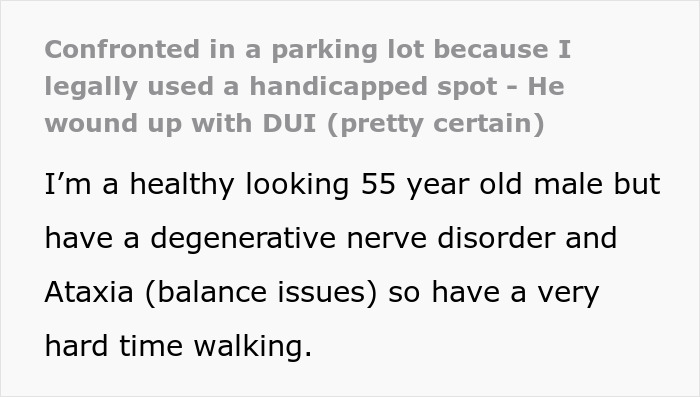

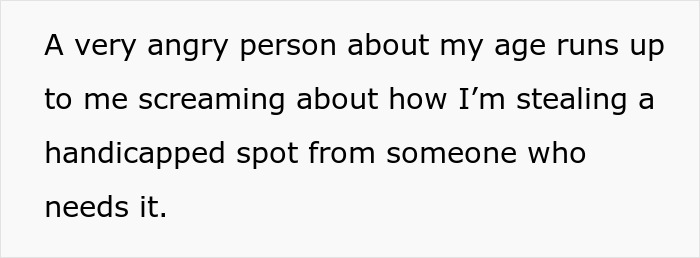


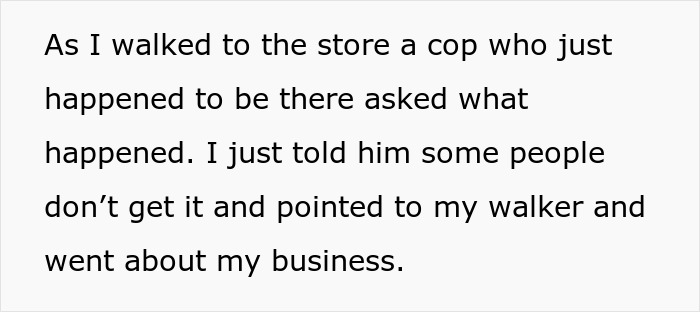



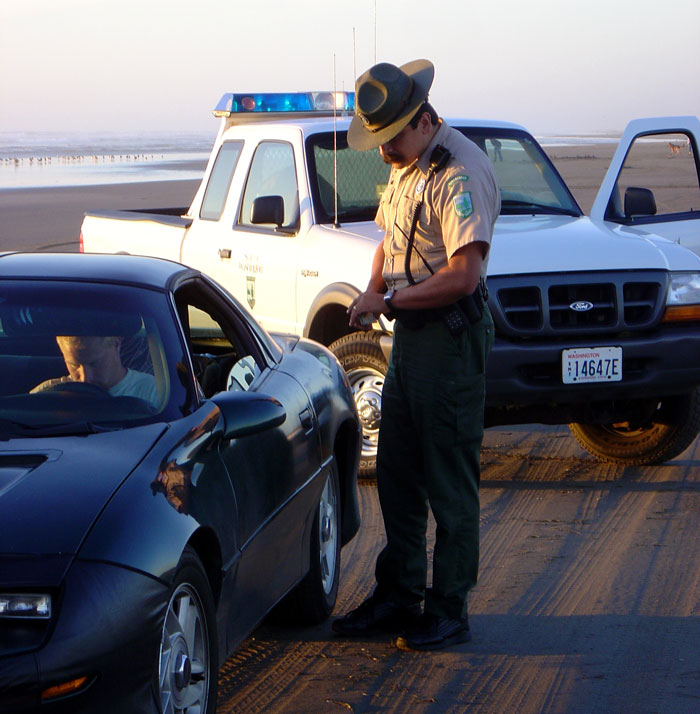

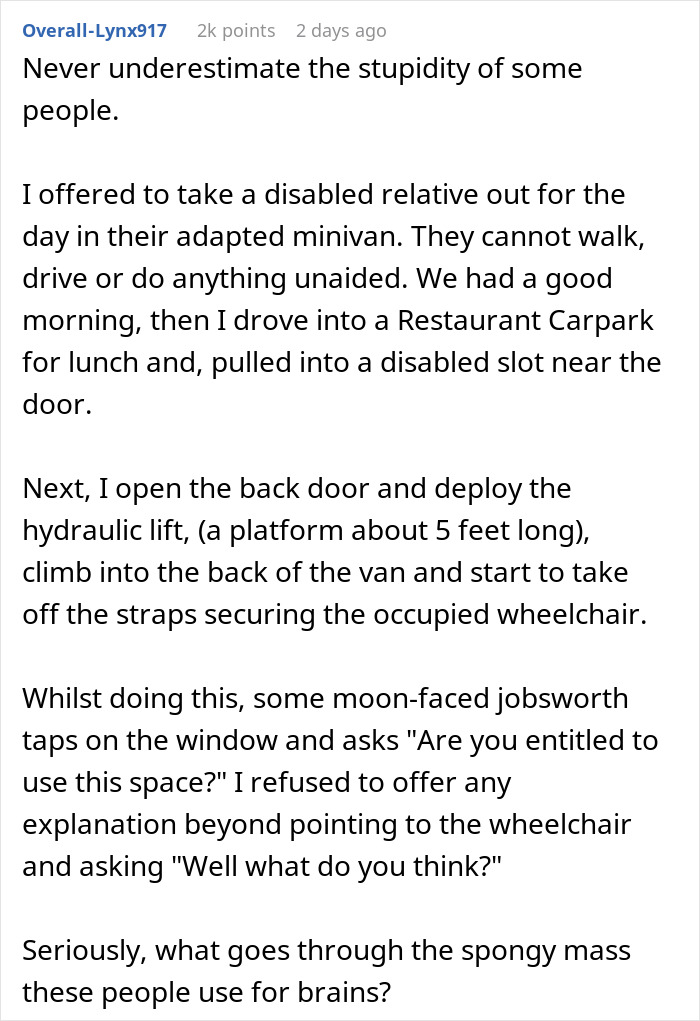

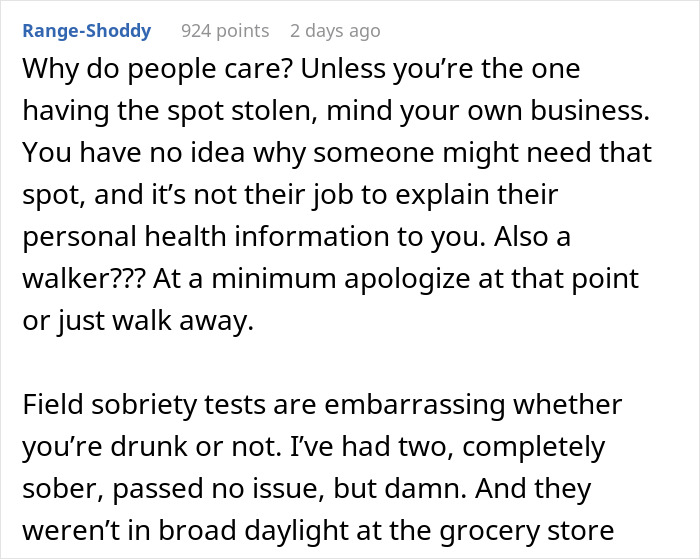
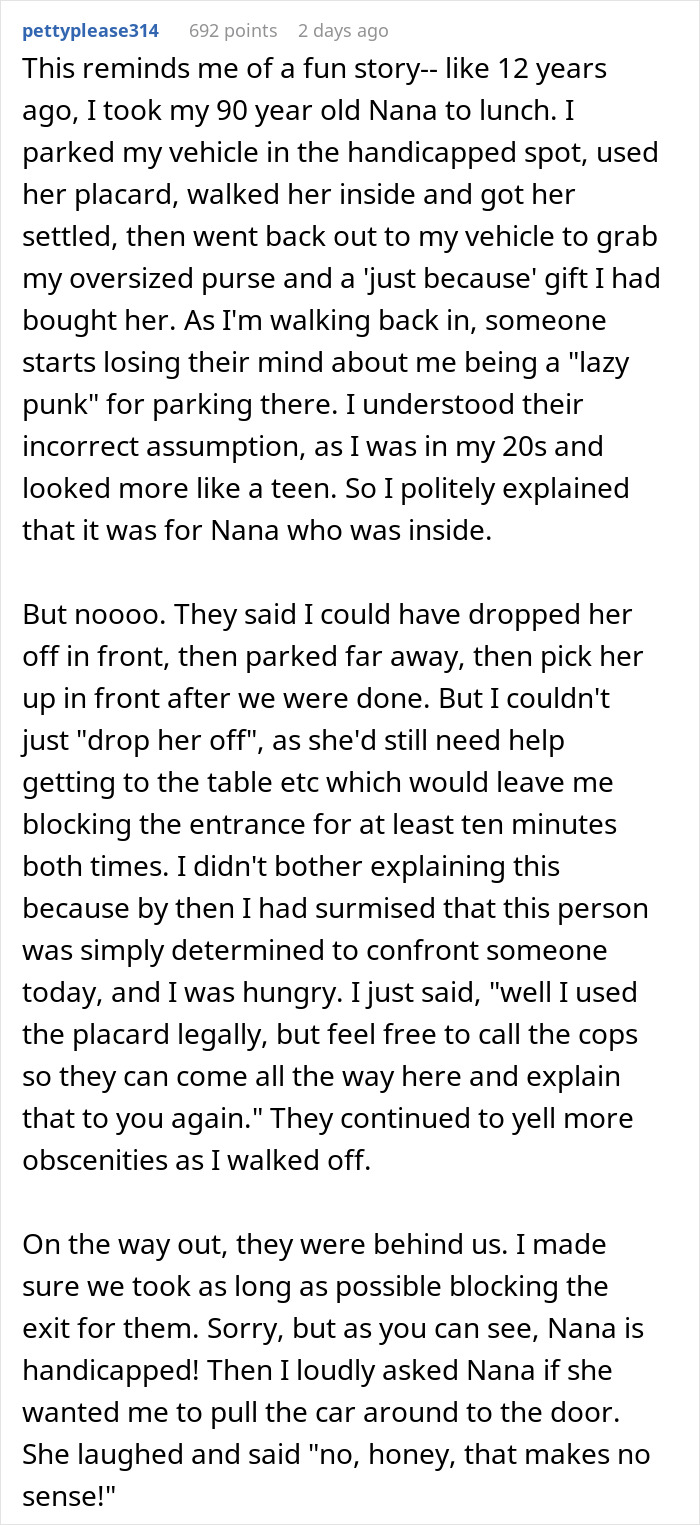
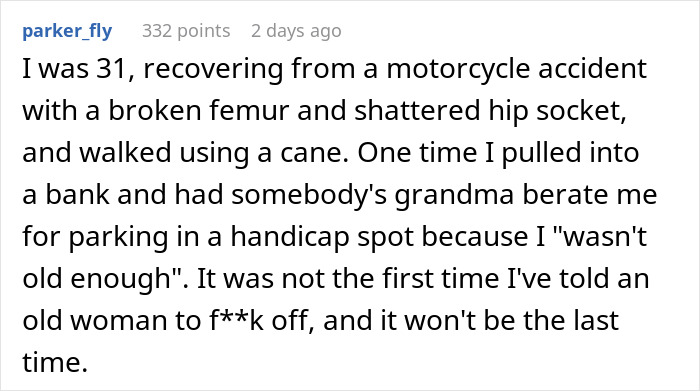
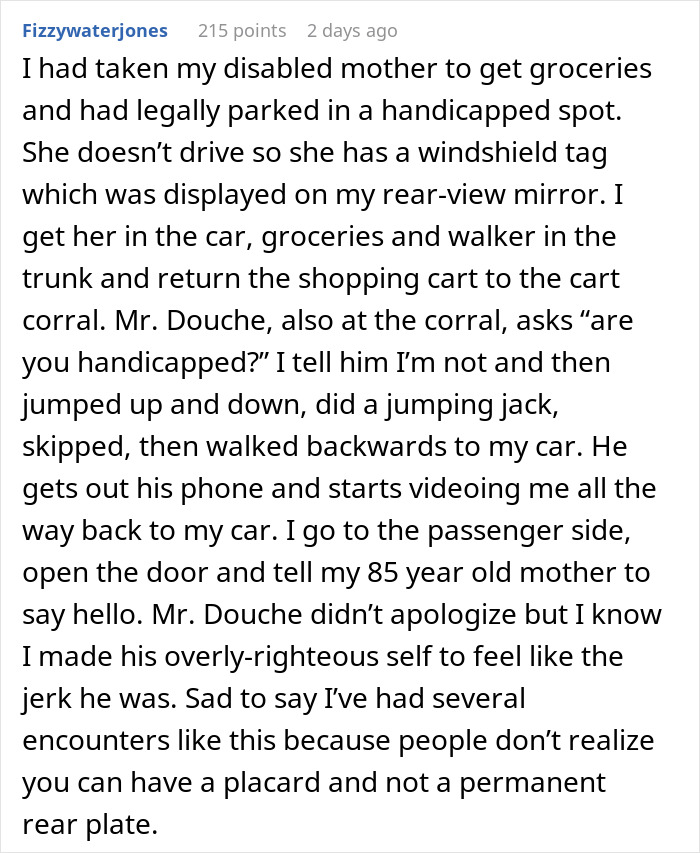
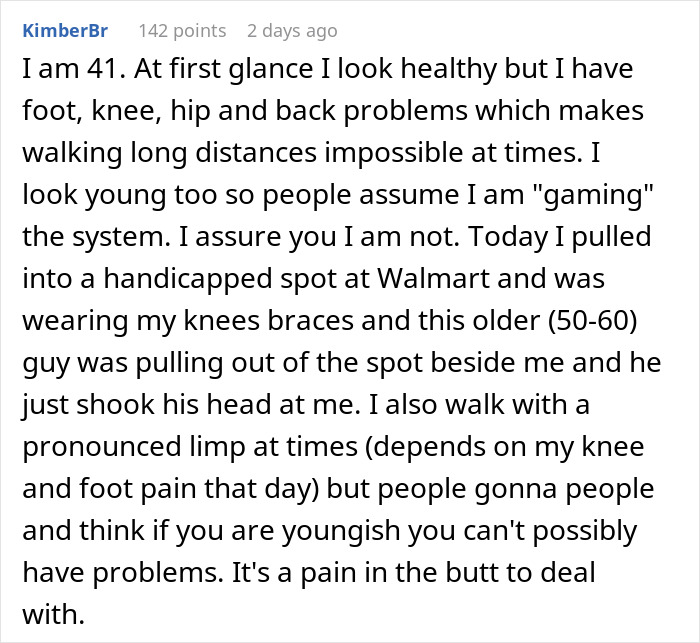
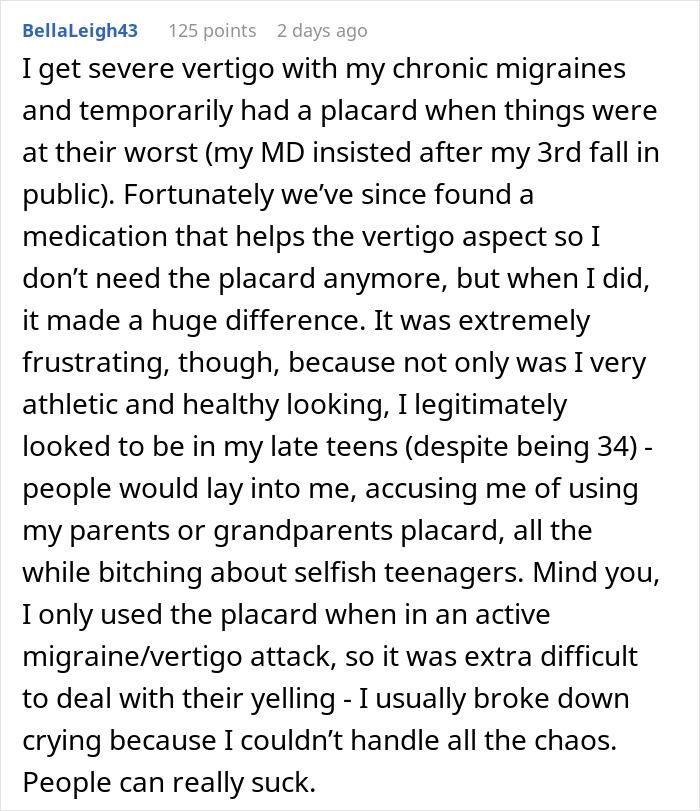


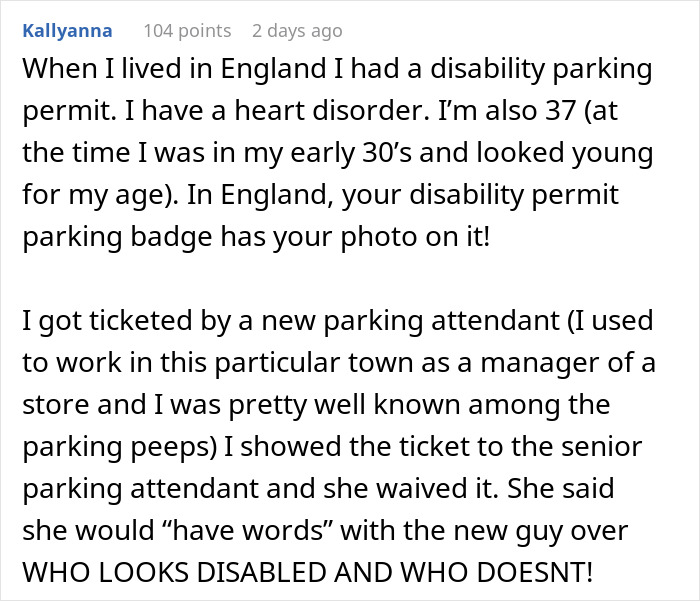
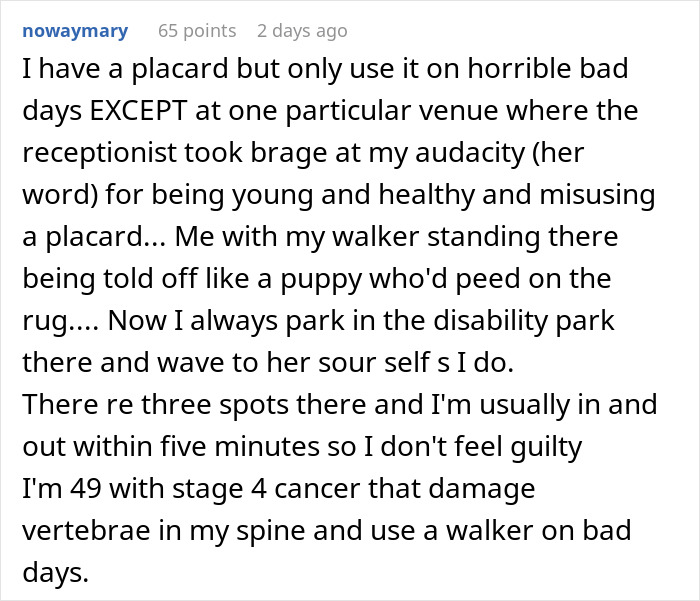


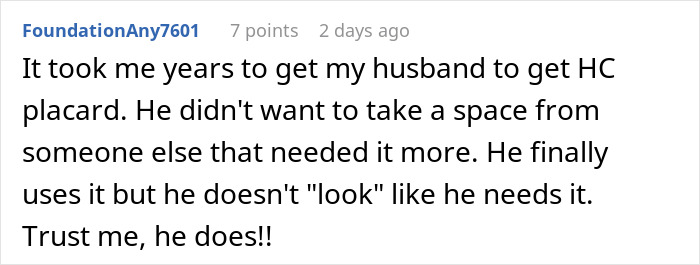




133
67